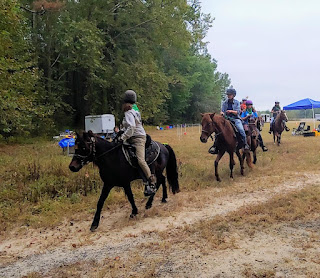Young riders have their own measures of success. As soon as they are comfortable cantering they want to try jumping. If jumping is possible then they want to try riding bare back. Then they want to move on to what is the ultimate measure of success in our program in their minds.
They want to lead the rides.
Few of them have any idea what that actually entails. They see only the status that being the lead rider seems to confer. They do not see the awesome responsibility that it carries.
I lead the rides more than 95% of the time. It is exhausting to do so. One must remain focused at every moment to make sure that all the riders behind are learning to become better riders and that their horsemanship is helping their horse to become a more confident mount. The ride leader must be alert to every sound, sight, and even smell that could cause a problem for any of the horses.
Advanced young riders who truly have the skill to lead rides recognize this are willing to lead a ride if needed, but have no desire to do so to demonstrate their power or status.
I long ago gave up any interest in controlling the behavior of others. The pursuit of power and status is evidence of a serious character flaw. It took me years to realize it, but it is every bit as serious a character flaw as is materialism or conformism.
Our program can only succeed if we refuse to accept the shallow values of not only the established horse world, but also of our culture as a whole. That means that the starting point of the program must be a radical rejection of self interest.
Many years ago my uncle sold the timber from his land adjoining the horse lot. He asked Daddy to ask me if I would mind if the lumber trucks went across a section of my land. Daddy told him that he would not ask me because I was not the kind of person who would even think of saying that the trucks could not enter simply because my name was on a deed.
When the girls at the Little House have needed a truck they have always known that they never had to ask for permission to use my truck. They simply had to make sure that I would not be needing it at the time that they would need it. To do otherwise would be to suggest that I was the kind of person who would say that they could not use the truck because it was "mine".
And now for the first time in decades I find myself wanting to own something for myself. I want an all metal resonating guitar. Worst of all, if I did purchase one I could not imagine myself giving it away to some kid down the road who might want to learn to play one but whose family could not afford to make such a purchase.
This does not bode well for the future of our program.
Whether I purchase such a guitar myself is irrelevant. The harm of wanting to own a thing is already done. What other weaknesses might follow? Might I start thinking that we need to do things to improve the appearance of the horse lot instead of putting all of my energy into improving the reality of our program? Might I start thinking of whether a horse is "mine" instead of thinking whether or not a given rider would have a good experience riding "my" horse?
During the pandemic I allowed my physical health to slip. When the blood work numbers came in from my last physical I began making radical changes to improve my health. I had a problem and I caught it in time.
It seems that during the pandemic I allowed my ethical health to slip. I need to make radical changes to improve my ethical health. I hope that I have caught it in time.







